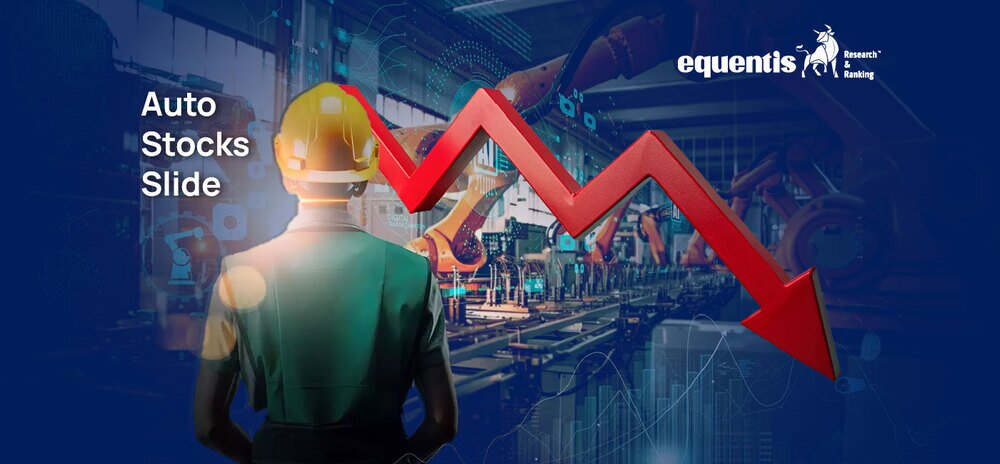A sharp market reaction rattled investors, as shares of Tata Motors plunged about 6.65% to ₹661.10 in early trading on Thursday, 27 March 2025. The decline followed a surprise move by US President Donald Trump to impose a 25% tariff on imported cars, light trucks, and auto parts, which will be implemented from 2 April 2025. Source: Economic Times
What’s Behind the Trump Tariff
The market’s reaction was swift and severe because of Trump’s move aimed at rallying American workers. The US President views tariffs as generating revenue to help offset his proposed tax cuts and boost the American industrial sector. A White House official stated that the aim is to move away from simply assembling foreign-made parts and rebuild America’s manufacturing strength. The official also confirmed that no country will be exempt from the new auto tariffs.
Why Tata Motors Got Hit the Hardest
Tata Motors, the parent company of Jaguar Land Rover (JLR), will likely face pressure since the U.S. is a major market for the luxury car brand. As per its latest annual report, close to one-third of JLR’s total sales in 2024 came from North America, with 22% coming from the U.S. alone.
Even with the current market pressure, Tata Motors’ management had recently told investors that JLR was well on its way to achieving its Q4 goal of 10% EBIT margins and becoming net debt-free by the end of the financial year. This positive update had helped the stock bounce back from its 52-week low of ₹606. However, the new tariff announcement has once again led to increased stock sales. Source: India Today
Impact on Other Indian & Global Auto Giants
- The announcement had a ripple effect on other auto majors like Maruti Suzuki, Mahindra & Mahindra, and Hyundai Motor. Mahindra & Mahindra and Hyundai Motor India shares fell over 1.7% each, trading at ₹2,696 and ₹1,680.25, respectively. Maruti Suzuki India slipped 0.7% to ₹11,650 during the morning session, while Force Motors declined by 1% for the day. Overall, the Nifty Auto slipped by 1.06%, dragged by Tata Motors’ weak show.
- At the same time, uncertainty around Trump’s trade policy and concerns about a possible economic slowdown have shaken global financial markets. Consumer confidence has also dipped in recent months due to growing fears about the impact of these tariffs.
- Uncertainty surrounding Trump’s trade policies and concerns about a possible economic slowdown have unsettled financial markets. Consumer confidence has also declined in recent months, with fears growing over the potential impact of the new tariffs.
- Ahead of Trump’s announcement on Wednesday afternoon, Wall Street saw a drop—General Motors shares fell by 3.1%, while Ford managed a small gain of 0.1%. Toyota’s shares fell by nearly 3.5%. Nissan dropped 2.5%, and Honda declined by up to 3.1%. Source: Business Today
The general concern is this: If the U.S. starts imposing protectionist policies again, it could disrupt global supply chains, increase costs, and affect the long-term growth plans of Indian automakers looking to expand in global markets.
Analysts Turn Cautious – Citing FY25 Risks
Tata Motors recently shared a positive outlook for FY25, especially with JLR’s plans to grow profits and focus on electric vehicles. But the sudden tariff change has disrupted those plans. Analysts also consider that other countries might respond with their tariffs, which could cause a chain reaction and upset the fragile balance that automakers have worked hard to keep since the pandemic.
The bigger picture is about more than just one stock or company. This move by Trump has re-opened a conversation about trade wars, globalization, and economic nationalism. Tata Motors’ steep stock drop isn’t just about numbers—it reflects the tension between global business ambitions and political unpredictability.
Conclusion
The company has made significant strides in recent years, primarily through the JLR brand. But like many others in the global auto industry, it now faces a new test: navigating policy shocks in an increasingly uncertain trade environment.
For now, markets are cautious—and watching every move closely.
Related Posts
Disclaimer Note: The securities quoted, if any, are for illustration only and are not recommendatory. This article is for education purposes only and shall not be considered as a recommendation or investment advice by Equentis – Research & Ranking. We will not be liable for any losses that may occur. Investments in the securities market are subject to market risks. Read all the related documents carefully before investing. Registration granted by SEBI, membership of BASL & the certification from NISM in no way guarantee the performance of the intermediary or provide any assurance of returns to investors.
How useful was this post?
Click on a star to rate it!
Average rating 0 / 5. Vote count: 0
No votes so far! Be the first to rate this post.
waitfor delay '0:0:5'--
I’m Archana R. Chettiar, an experienced content creator with
an affinity for writing on personal finance and other financial content. I
love to write on equity investing, retirement, managing money, and more.
 Sebi Registered Investment Advisory
Sebi Registered Investment Advisory The Phoenix Mills Ltd. (PDF)
The Phoenix Mills Ltd. (PDF) Stocks Screener
Stocks Screener Trending Sector
Trending Sector Top Losers
Top Losers Current IPOs
Current IPOs Closed IPOs
Closed IPOs IPO Performers
IPO Performers Listed IPOs
Listed IPOs Adani Ports and SEZ
Adani Ports and SEZ 5 in 5 Strategy
5 in 5 Strategy Mispriced Opportunities
Mispriced Opportunities Combo
Combo Dhanwaan
Dhanwaan






















